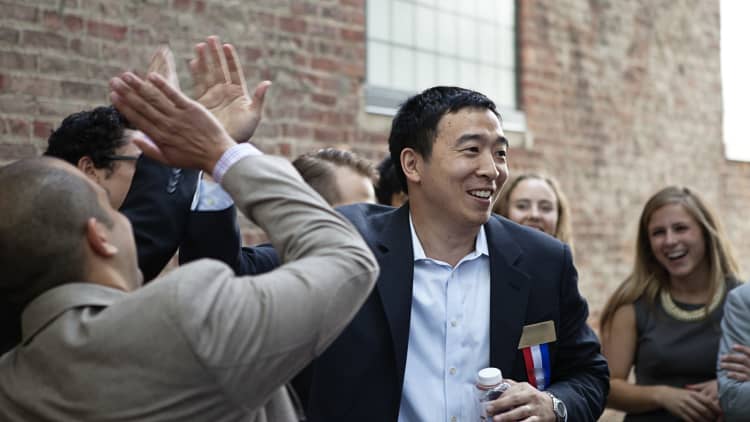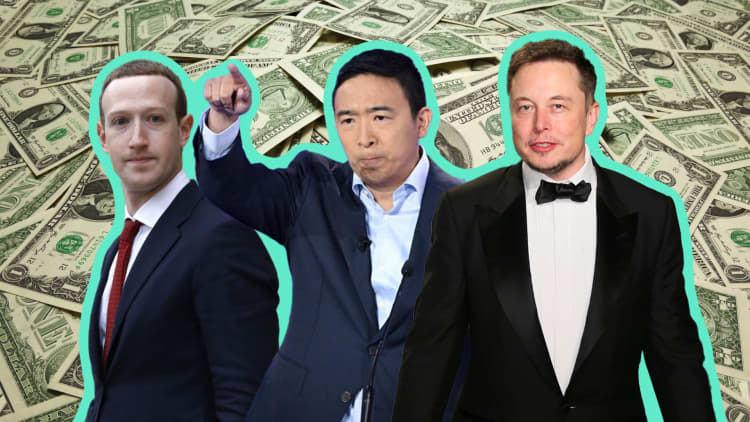Andrew Yang, the Democratic presidential candidate best known for his $1,000-per-month universal basic income platform, says tech giants should pay people for use of their data.
"Right now, our data is worth more than oil," Yang said during Tuesday's Democratic debate in Ohio. "How many of you remember getting your data check in the mail? It got lost. It went to Facebook, Amazon, Google."
Yang offered the idea as a way to handle such tech megaliths instead of just breaking them up (which some, like Democratic candidate Sen. Elizabeth Warren, have advocated).
Though there are "absolutely excesses in technology and in some cases having them divest parts of their business is the right move," according to Yang, "we also have to be realistic that competition doesn't solve all the problems.
"It's not like any of us wants to use the fourth-best navigation app. That would be like cruel and unusual punishment. There is a reason why no one is using Bing today. Sorry, Microsoft. It's true," Yang said during Tuesday's debate.
Yang said that if "we say this [data] is our property and we share in the gains, that's the best way we can balance the scales against the big tech companies," calling it "the best way we can fight back."
According to Yang, companies should first be required to have customers opt-in to data collection, with a "clear and easy-to-understand statement about what is being collected and how it is going to be used." Those who do opt-in and share personal data with companies should then "receive a share of the economic value generated from your data."

"Every time we post a photo or interact with a social media company, we're putting information out there, and that information should still be ours. If somebody is profiting from our data and we decide willingly to partner with a company that's making use of this information, then that's only fair as long as we get a slice," Yang told The New York Times in a story published Tuesday. "Right now we're unaware of the value that's changing hands and we're definitely not getting a data check in the mail every season."
Right now, our data is worth more than oil.Andrew YangDemocratic presidential hopeful
The idea to pay users for their data is not unique.
"California, Colorado, Canada federal [lawmakers] and U.S. federal [lawmakers] are all working on this heavily and many presidential candidates are considering it. It has bipartisan support. So there is definitely something there and expect to hear more about it," Glen Weyl, founder and chair of the nonprofit RadicalxChange Foundation, tells CNBC Make It. Weyl, whose group advocates for equitable distribution of the data economy, also works at Microsoft researching how technology will affect, and be affected by, global political and economic challenges.
In his State of the State address in February, California Gov. Gavin Newsom said consumers should be compensated for use of their data.
"I've asked my team to develop a proposal for a new Data Dividend for Californians, because we recognize that your data has value and it belongs to you," he said.
And in June, Sens. Mark R. Warner, D-Va., and Josh Hawley, R-Mo., proposed a bill that would require companies that use consumer data and have over 100 million monthly active users to disclose to consumers what data they are collecting and how it is being used to make a profit.
"For years, social media companies have told consumers that their products are free to the user. But that's not true – you are paying with your data instead of your wallet," Warner said in a statement at the time the bill was released.
The bill is pending, but Warner hopes to include it in larger data privacy legislation in 2019 or 2020 to become law, according to his communications director, Rachel Cohen.
Still, despite the germinating interest in paying for data, "there is a big question of what this actually means and how it happens," Weyl said.
He says consumers banding together to lobby the tech companies is the most plausible route, citing labor unions as an example of such a movement. "It would be challenging," Weyl tells CNBC Make It, adding that "legislation can help stimulate this new sector" as well.
Paying money to each person whose data is used by companies like Facebook (which currently has 2.7 billion monthly active users on at least one of its family of services, including Instagram, WhatsApp and Messenger) would also require establishing the infrastructure and logistical organization to pay those billions of people. Some industry insiders have said this is too complicated to be realistic.
"You can't control data," Nancy Kim, a professor of law and internet studies at the California Western School of Law, told Engadget in 2018. "It's not like I give you something tangible and I say every time you rent that tangible thing out, you give me a royalty, a certain payment."
But according to Yang, "I guarantee you that if it was reversed and it was tech companies that needed to extract tolls from millions of consumers, there'd be zero issue with the administrative barrier," he told the Times. "The company would be like, 'I need your credit card.'"
Facebook, Google and Amazon did not respond to CNBC Make It's requests for comment.
See also:
This 43-year-old running for president in 2020 wants to give everyone $1,000 a month in free cash
Why everyone is talking about free cash handouts—an explainer on universal basic income

Like this story? Subscribe to CNBC Make It on YouTube!


